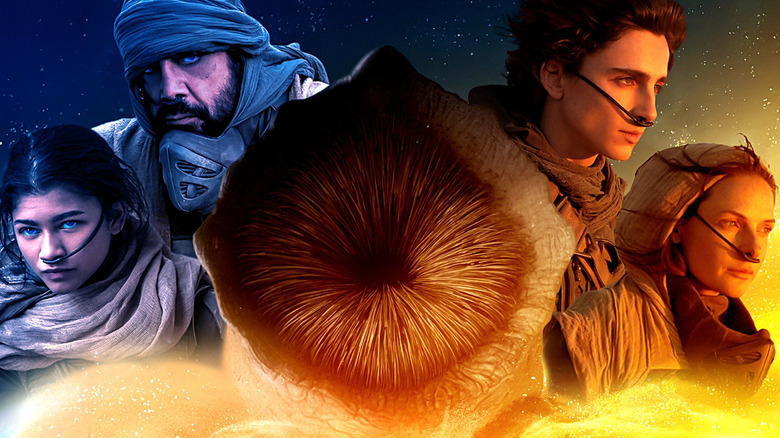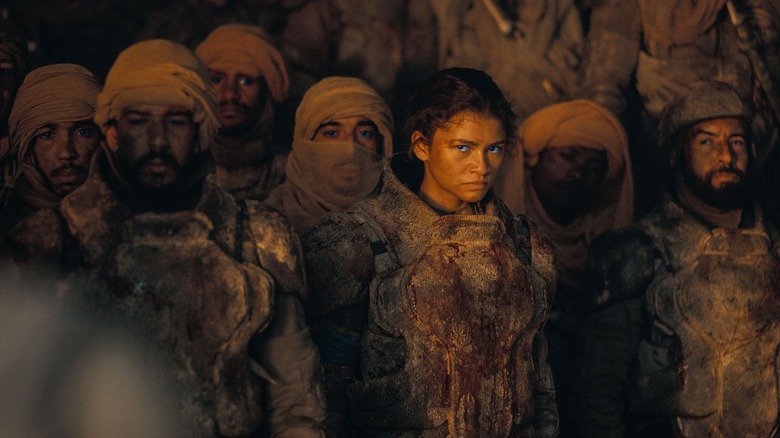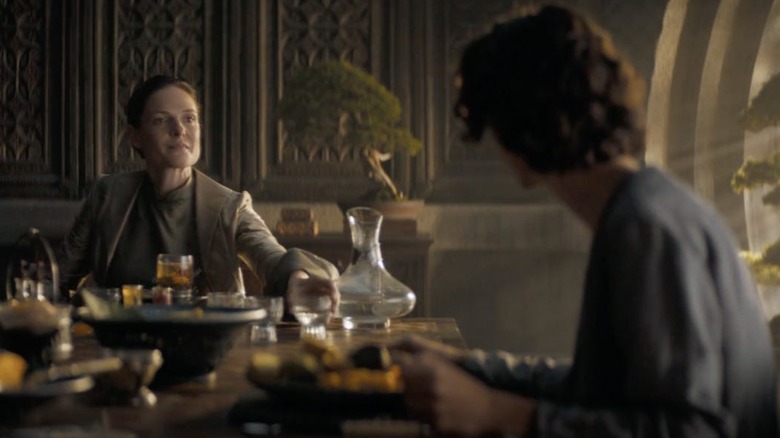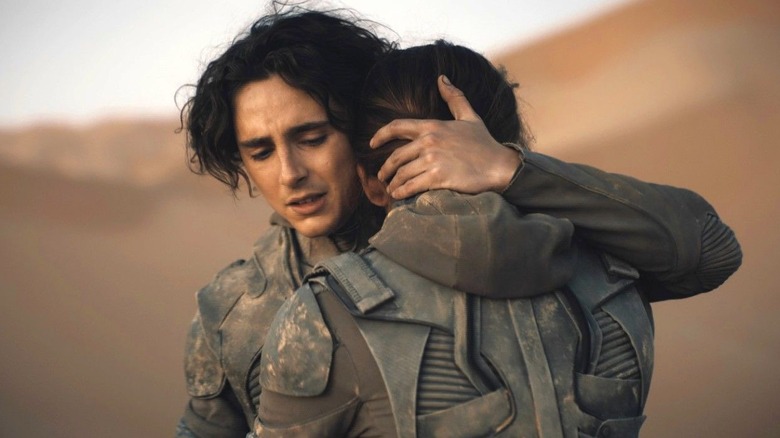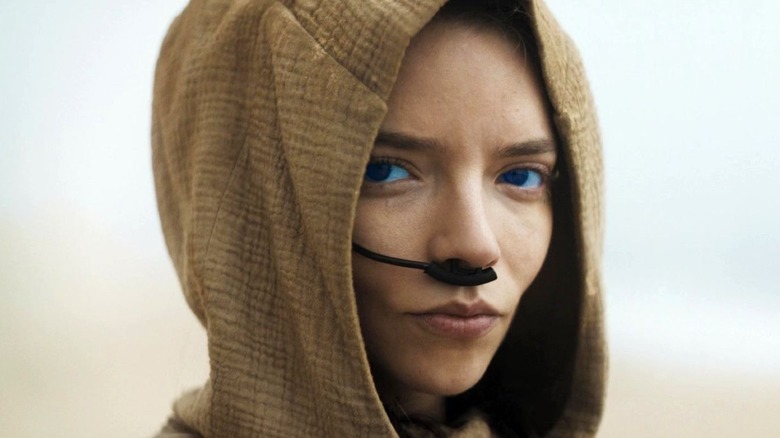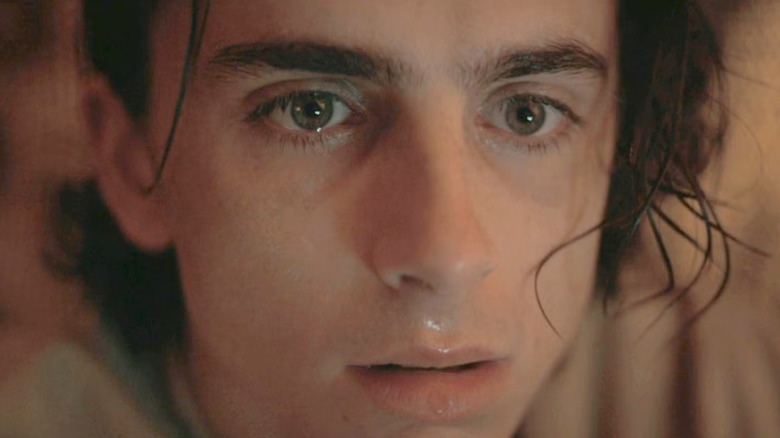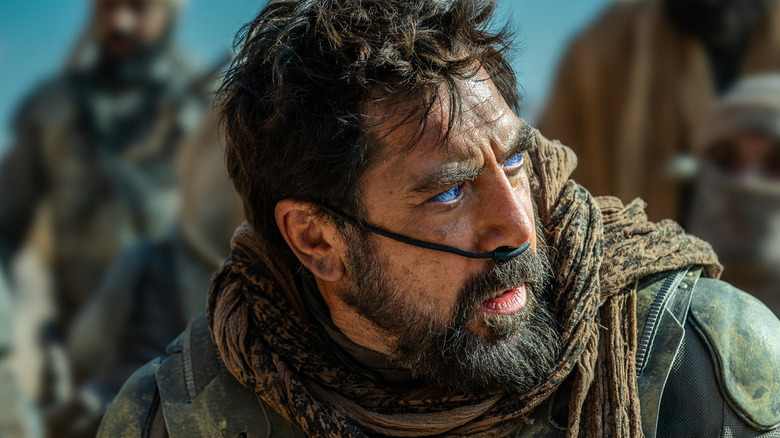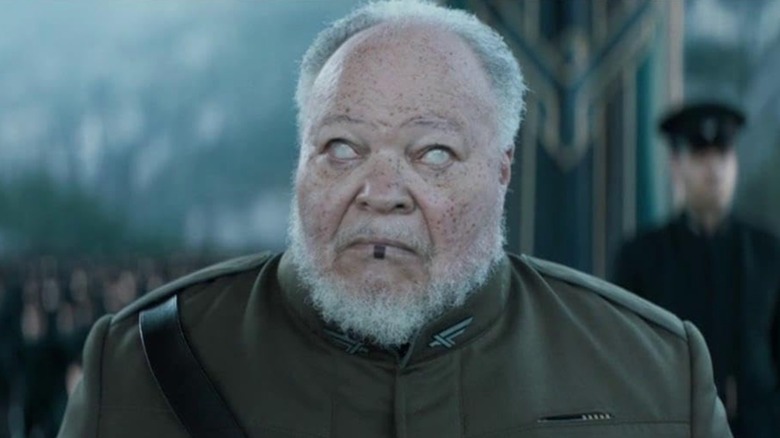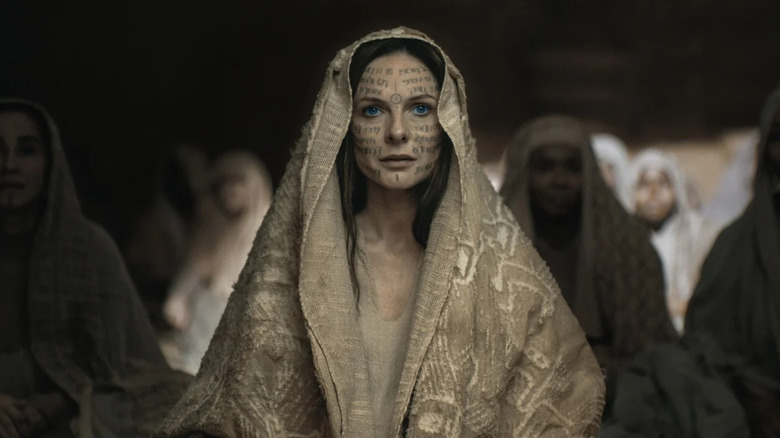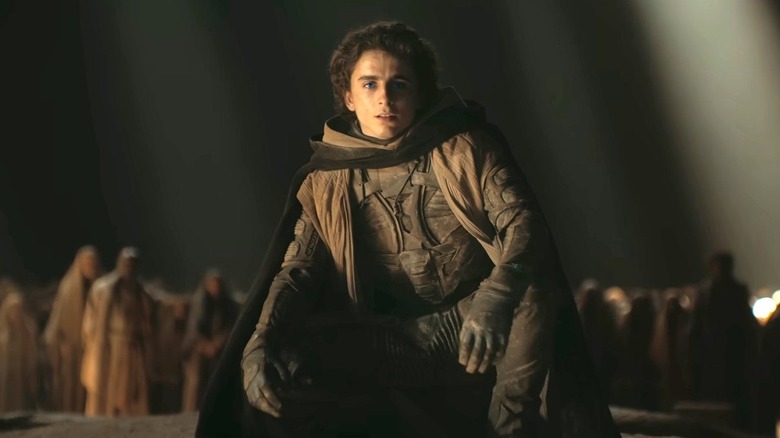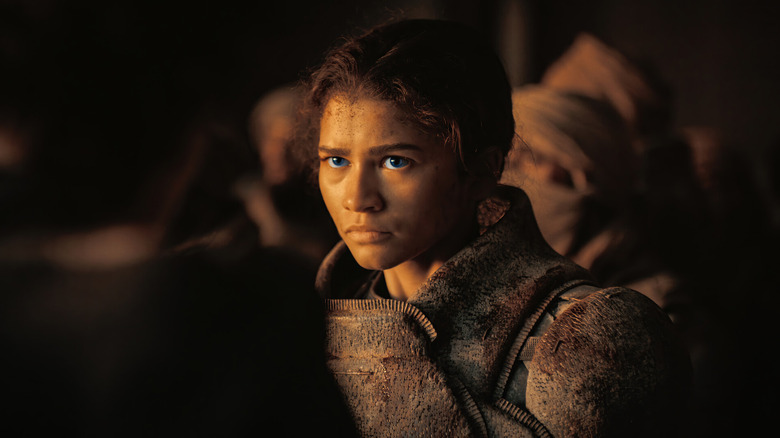Dune's 10 Biggest Changes From The Books
It's hard to believe over a year has passed since "Dune: Part Two" blasted its way into theaters like a sandworm burrowing through the Arrakis desert. Critically adored and embraced by fans, the adaptation of the second half of Frank Herbert's acclaimed novel does a commendable job of translating a complex storyline for general audiences. The result is a "bleak blockbuster about religion, revenge, and really big worms," per our own "Dune: Part Two" review, sprinkled with thrilling set pieces, thought-provoking material, an excellent score by Hans Zimmer, and astonishing performances from the likes of Timothée Chalamet, Rebecca Ferguson, Zendaya, Oscar Isaac, Javier Bardem, and Stellan Skarsgård. How the heck did this thing not win Best Picture at the Academy Awards?
Praises aside, to streamline the sprawling narrative, Villeneuve was forced to make a few changes. We've compiled a list of the biggest changes from the books for your reading pleasure, a fascinating exercise as these alterations leave a significant impact on the story. So, grab some spice and prepare for a journey into the heart of "Dune."
Fundamentalists
Denis Villeneuve makes a radical change right from the outset of "Dune: Part Two" by splitting the Fremen into different camps — the northerners, a skeptical group with no faith in religion, and the southerners, comprised entirely of religious fanatics or fundamentalists. In the book, the Fremen operated as one, united behind Stilgar and the prophecy. When Paul (Timothée Chalamet) rose to power, they accepted his role without question. A few characters, such as Chani (Zendaya), raised concerns, but even they saw Paul as a necessary step toward salvation.
By contrast, the film presents a whole sect of people, including Chani, who outright scoff at any notion of prophecy and see Paul as a threat. Lady Jessica does her best to sway these northerners but eventually heads south to rally the fundamentalists to her cause, as doing so practically ensures victory.
Was this a necessary change for the story? Probably — much of Frank Herbert's novel revolves around the dangers of religious fanaticism, an idea that's difficult to translate visually. By showing the sharp contrast between skeptics and zealots, the movie offers a clearer picture of the dangers inherent in a messianic figure. Still, this approach isn't without its issues, as we explain in the Chani slide below.
The dinner scene
Frank Herbert's "Dune" employs a bevy of heady material, with many of its strongest moments arising from simple conversations between intelligent characters. Early in the book, shortly after arriving on Arrakis, the Atreides sit with a handful of dinner guests, each with differing motivations. Paul gets into a heated verbal exchange with a banker, calling out his not-so-veiled threats via a pair of analogies about birds and drowning fishermen. Lady Jessica maintains Bene Gesserit intensity while supporting players like Gurney Halleck (played by Josh Brolin in the films) remain on alert. Throughout, Herbert delves deeper into Arrakis' politics, all the while highlighting the precariousness of the situation for Duke Leto.
Surprisingly, this sequence doesn't appear in Denis Villeneuve's picture, likely due to the lack of action. No matter, Villeneuve finds other creative ways to show the Atreides' plight, and provides several instances of Paul demonstrating his leadership capabilities, particularly in his handling of Stilgar (Javier Bardem) during their first encounter. That said, it's a shame we don't get to spend more time digesting the politics of this strange universe, as they provide more depth to the story.
Paul and Chani's child
If you thought Paul and Chani's love story in "Dune" was tragic, take a gander at what happens to them in the novel. While Chani never deviates from her husband (see below), the pair incur a terrible loss when their child, Leto II, dies. In the text, the kid is only mentioned a handful of times before perishing during the attack on the sietch. His death further motivates Paul to take revenge on his enemies, further compounding his tragic journey.
By comparison, in the film, it's clear that Denis Villeneuve wants Paul's journey towards darkness to be more straightforward. Having his child murdered would only amplify audience sympathy, leaving many to cheer on his revenge-fueled campaign and overlook the horrifying consequences. And that's really the difference between the book and movie. The former paints an ambiguous cautionary tale about a tragic figure who is forced to follow a perilous path to ensure the survival of the human race. Villeneuve, however, opts for a darker, more straightforward narrative about a man who uses his powers to start a war — one that many, including Chani, view as wrong.
Whether one version works better than the other depends on your perspective: Do you prefer a nuanced meditation on power and prophecy, or a more direct, personal tragedy about a man's fall from grace?
Alia
Fans of the "Dune" novels were no doubt excited to get a peek at Denis Villeneuve's iteration of Alia Atreides, Paul's psychotic sister. Alas, aside from a brief cameo, played by none other than Anya Taylor-Joy, who bent over backwards for the "Dune: Part Two" gig, the character has little impact on the story. Lady Jessica (Rebecca Ferguson) spends a considerable amount of time talking to the child inside her womb, a clever device that allows us to understand her thoughts, but Alia doesn't appear in physical form aside from a dream sequence.
This marks a notable shift from the source material. In the novels, Alia is physically present as a small child during the Battle of Arrakis. It is she whom the Reverend Mother refers to as an "abomination," due to her exposure to the Water of Life while still in the womb — granting her unnatural abilities, including full access to ancestral memories from birth. In one of the book's most shocking moments, she uses this knowledge to murder Baron Harkonnen with the Gom Jabbar — an act that, in "Dune: Part Two," is instead given to Paul. Chances are, we'll see a lot more of Taylor-Joy in the already in-production "Dune: Messiah," where Alia plays a more prominent role, but it's a shame to have missed out on such a creepy character.
Spice
This might sound like nitpicking, but considering the importance of Spice to the "Dune" universe, we expected it to receive more screen time. Alas, aside from a quick bit of exposition in "Dune: Part One" and some text at the beginning of "Part Two" — "Power over Spice is power over all!" — the films never fully explain Spice's significance. Viewers unfamiliar with the book series will likely ask, "What's the big deal? Why is everyone fighting over this worm-ravaged desert planet?"
Spice, you see, is more than a plot device — it is literally the lifeblood of the Imperium. Without Spice, space travel collapses, the Bene Gesserit lose the ability to prophecy, and Paul's transformation into the Kwisatz Haderach becomes impossible. Remember that scene in "Part Two" when the Harkonnens observe holograms of Arrakis? That's Spice at work. In the books, it's also a powerful life-extending drug, a religious sacrament, and the backbone of the empire's economy. It's "Dune's" equivalent of oil, gold, and prophecy all rolled into one.
Villeneuve's films focus more on Paul's transformative journey, allowing for a more streamlined adventure. Understanding the importance of spice control supplies greater weight to the story. It would clarify why the Emperor fears losing Arrakis, why the Fremen fight so fiercely, and even why those giant worms roam the desert.
Stilgar
Look, as much as we enjoy Javier Bardem's performance as Stilgar in the "Dune" saga, Denis Villeneuve did the character dirty. In Frank Herbert's novel, Stilgar is a wise, stoic, and level-headed leader. He sees Paul's potential as the Messiah, but approaches his rise with trepidation, initially viewing the young man with considerable skepticism. Over time, he trusts Paul after careful observation, eventually evolving into a fiercely loyal supporter.
Bardem's characterization portrays Stilgar as a religious zealot (read: nutjob) obsessed with prophecies and signs, often to the detriment of his people. Heavy expository dialogue replaces his wise words, while a handful of maniacal outbursts force viewers to question how he ascended to his current rank. Bardem captures Stilgar's warmth and humor early in the picture, but he devolves into a walking, tragic meme — "Lisan al Gaib," he shouts over and over again — designed to underline the point Villeneuve wants to make about the dangers of blind faith. While this approach gets the job done, it oversimplifies Herbert's complex narrative, as the only people supporting Paul are totally bonkers.
Thufir Hawat
At just under three hours apiece, the "Dune" films already tested the limits of bladder control; there wasn't enough time to include every character/detail from the books. We already mentioned the absence of Paul's children and (save for that brief cameo) his sister Alia, jettisoned to give characters like Lady Jessica more to do in the story. And yet, the most tragic dismissal is probably Thufir Hawat (Stephen McKinley Henderson), Duke Leto's Mentat and Master of Assassins, responsible for Atreides House security. The character enjoys a meaty role in "Dune: Part One," appearing as a good friend and supporter of Leto (Oscar Isaac) and Paul. A key moment has him, so ashamed of his conduct, offer to resign after an assassin nearly eliminates Paul. Leto refuses Hawat's proposal and even rebukes him: "You would deprive us of your talents at this time?"
Curiously, Hawat vanishes from the narrative following the fall of House Atreides. Again, his absence makes sense — he's not crucial to the overarching plot, per se — but he does play a key role in the second half of Frank Herbert's novel. Captured by the Harkonnens, he's manipulated into serving them, believing that Jessica is the true traitor behind House Atreides' fall. His arc ends tragically, with Hawat taking his own life after realizing he's been used to unwittingly betray Paul.
Denis Villeneuve actually shot more scenes with Henderson, but ultimately chose to leave those Hawat scenes on the cutting room floor. Release the Hawat cut!
Lady Jessica
Another character who undergoes a significant transformation is Lady Jessica. While she plays an important role in both versions of the story, her character is more prominent in the film and practically walks hand in hand with Paul during his transformative journey. After becoming the Reverend Mother in "Dune: Part Two," she uses her status to lure the Northern Freman to her cause, and eventually travels south to deal directly with the Fundamentalists. She also urges Paul to drink the Water of Life, a pivotal moment that allows the young boy to step forward as Maud'Dib.
Otherwise, both versions of the character are roughly the same, although Rebecca Ferguson's portrayal carries significantly more emotion and vulnerability. Still, in the novel, Lady Jessica defies the Bene Gesserit by giving birth to Paul, ensuring the fulfillment of their fabricated prophecy, and spends a good chunk of the story pregnant with Alia. However, on the page, Lady Jessica slips into a more minor supporting role following her ascension to Reverend Mother and practically vanishes from the story, an aspect that didn't sit well with Denis Villeneuve. By giving her more dimension as a character and a more prominent role in the story, Paul's journey feels even more tragic, as even those closest to him appear to be manipulating him for personal gain.
Harkonnen lineage
One of the key details in "Dune: Part II" was not designed as an "Empire Strikes Back"-esque twist. Late in the film, after drinking the Water of Life, Paul tells Lady Jessica that he now sees everything, including their past, and reveals a horrifying truth: They're Harkonnen. Lady Jessica is the daughter of Baron Vladimir Harkonnen, the man responsible for the fall of House Atreides. Whoa! Unlike Luke Skywalker, Paul doesn't scream in horror or deny the truth. Instead, he embraces it. In that moment, he adopts the Harkonnen method — ruthlessness, manipulation, violence — to win his war. He turns his back on his father's diplomatic ideals and fully steps into the conqueror role. Hey, it works!
In the book, Paul realizes his Harkonnen lineage much earlier, immediately after the attack on House Atreides, when he and Lady Jessica are chilling in a tent. "We carry our past with us. And, mother mine, there's a thing you don't know and should — we are Harkonnens," he exclaims before pointing out her relationship to the Baron. It's a noteworthy change if only because the revelation shapes the way we view Paul in each story. Frank Herbert presents Paul as aggressive much earlier, giving readers time to digest his darker, more manipulative trajectory. On the other hand, Denis Villeneuve withholds the truth to keep audiences aligned with Paul until his dramatic shift to the dark side in the final act.
Chani
However, the most significant change in "Dune" lies in the film's interpretation of Chani. In Frank Herbert's novel, Chani is wholly devoted to Paul and plays a more passive role in the larger narrative. Though she occasionally questions his motivations and is wary of his prophetic visions, she never turns against him. Even when Paul chooses to marry Princess Irulan for political purposes, book Chani trusts his judgment, recognizing that each move he makes is necessary for a greater future.
By contrast, the movie version of Chani is far more independent and skeptical. She dismisses the prophecy and Paul's supposed role as a messianic figure. At one point, she laughs at a ritual involving Lady Jessica and mocks Stilgar's extreme devotion to his religion, an act that earns her a sharp reprimand from the Freman leader. Later, she aids in Paul's resurrection and takes part in his attack against the Emperor, though reluctantly so. When she hears Paul's proposal to Irulan, she storms off into an unknown future.
Curiously, despite Chani's abject rejection of the religious ideologies of her fellow Freman, Paul explains that she will come to understand his actions, setting the stage for reconciliation in the upcoming "Dune: Messiah." We can't wait to see how that shakes out, as film Chani's fate heads in a much different direction than her book counterpart.
